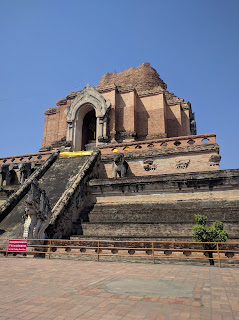Good afternoon, everyone! How are you doing? It is quite warm in Bangkok today, 37 degrees C, so 98.6 degrees F! It’s amazing and baffling that it isn't summer yet ... meanwhile back in my home town:
[Not sad to be missing that - at all]
This last week, I spent time in Chiang Mai, a city in northern Thailand. It was incredible, beautiful, and hot! Here are few pictures of my travels:
[Chiang Mai is often called the cultural capital of Northern Thailand. Truly so, it definitely has more cultural escapades/activities to do than Bangkok.]
[School visit in Chiang Mai!]
Chiang Mai has over 300 Buddhist temples (a temple is also called a "Wat") in the old city - when you walk around the old city, temples are everywhere. I wonder what the percentage of the old city’s surface area is taken up by temples ... I would wager 30-50 percent.
I want to talk about the intersection of religion, culture, and poverty. A school lunch program is considered a social welfare program, as it directly responds to poverty and malnutrition in communities. Perceptions of poverty and social welfare vary between cultural contexts - and I find the Thai perception of poverty to be especially interesting.
Just a note before we jump in - I will be quoting/using several Buddhist resources as a guide; since I have only had indirect experiences with Buddhism, I do not want to characterize it in any light. I will let the experts share instead!
Thai Buddhism and Thai Culture
Buddhism is the dominant religion in Thailand, with over 90 percent of the population identifying as Buddhist. Though there are differences between the multiple branches of Buddhism, two fundamental features of Buddhism are Karma and reincarnation. Karma "operates in the universe as the continuous chain reaction of cause and effect. It is not only confined to causation in the physical sense but also it has moral implications. 'A good cause, a good effect; a bad cause a bad effect' is a common saying. In this sense karma is a moral law." Simply, one’s actions has consequences.
Reincarnation, or "Rebirth," is generally well-known among laypeople. Buddhists believe in “samsara,” which holds that life is a constant cycle of death and rebirth. Reincarnation is the process of exiting a life and entering into the next. As a life continues through these cycles, one can escape this cycle by achieving Nirvana. Nirvana, or “enlightenment,” is achieved when one is able to remove himself from outside pressures and desires.
It is important to clarify what reincarnation is not:
“Reincarnation is not a simple physical birth of a person; for instance, John being reborn as a cat in the next life. In this case John possesses an immortal soul which transforms to the form of a cat after his death. This cycle is repeated over and over again ... This notion of the transmigration of the soul definitely does not exist in Buddhism.”
When combining reincarnation and karma, poverty is simplified to a “bad effect” of poor moral decisions - which has significant implications for the Thai perception of poverty. If a Thai person is born into poverty or with some form of chronic illness or disability, this is considered a consequence of poor decision-making (“bad karma”) in his previous life. Thai culture enforces that he “deserves” his situation, resulting in fewer services and less empathy towards these individuals. The belief, or “remedy” for a chronic ailment, is that if the individual has good karma in his current life, he will be wealthier and healthier in his next life.






No comments:
Post a Comment